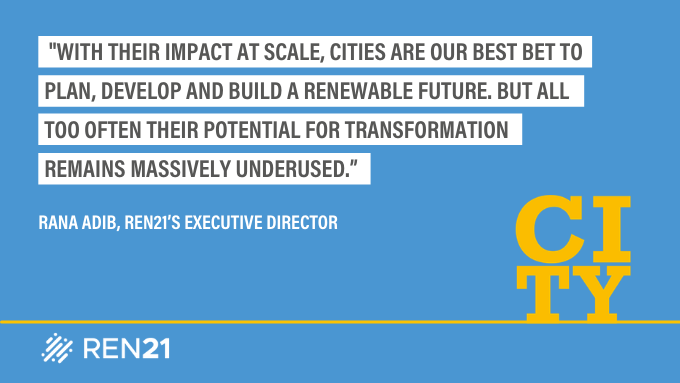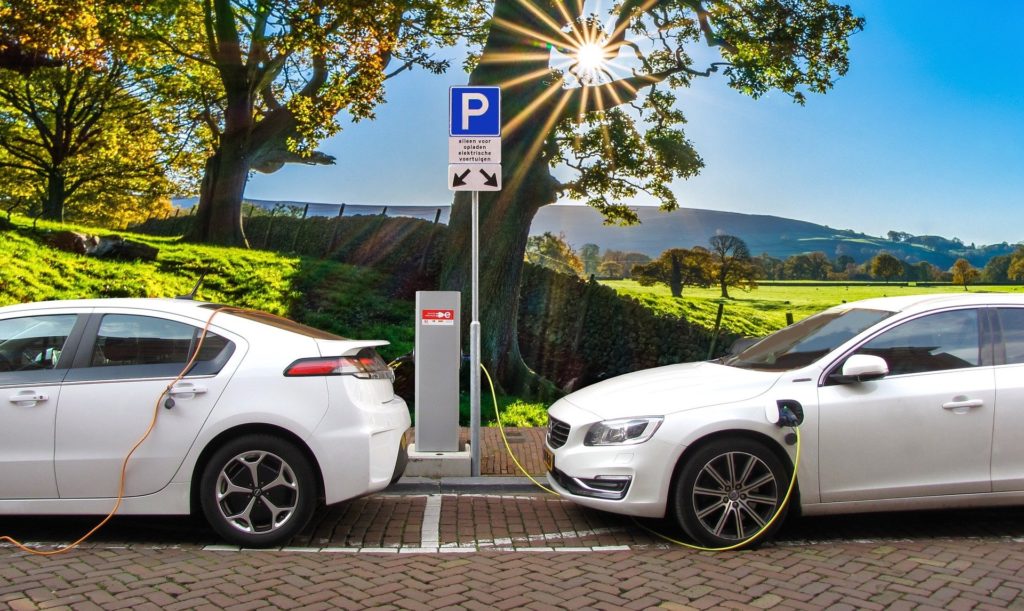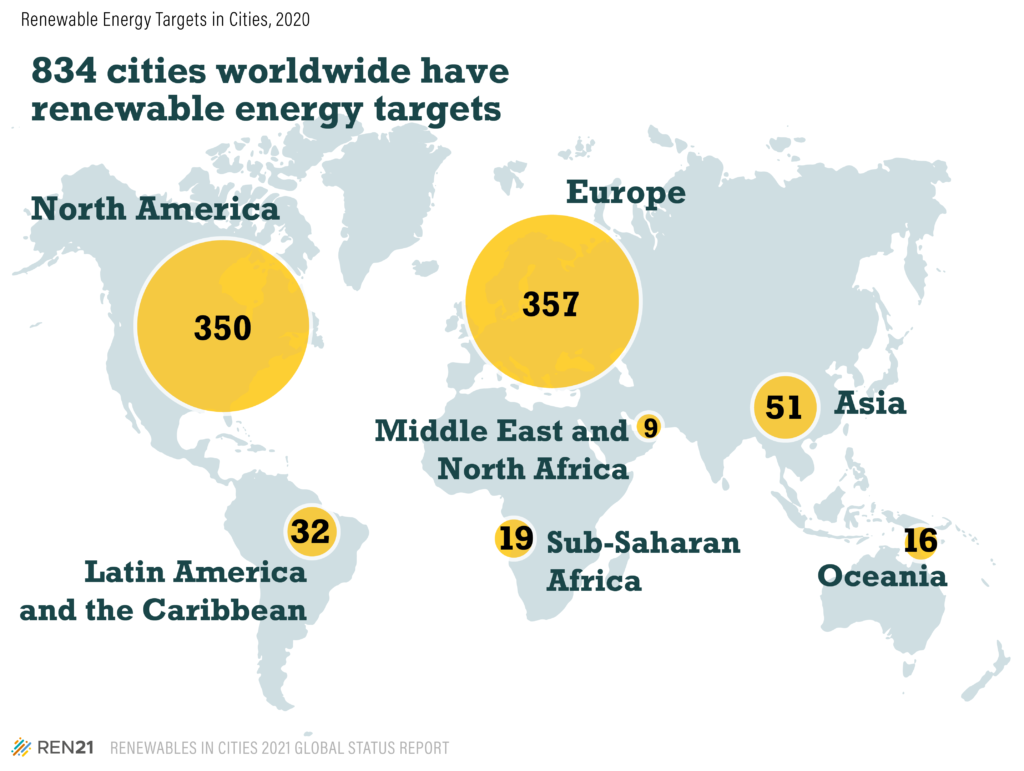Over 1,300 cities, from the Americas to Sub-Saharan Africa, have demonstrated leadership in advancing renewables. National governments must give them the power to act.
Read the NEW Renewables in Cities 2021 Global Status Report.
The Renewables in Cities 2021 Global Status Report shows that more than 1 billion people – about 25% of the urban population – live in a city with a renewable energy target and/or policy.
City governments around the world are increasingly using renewables to help fight energy poverty, reduce air pollution, tackle climate change, and improve public health and well-being. They have installed, purchased and contracted for renewable energy to meet the demand of their own buildings and vehicle fleets; adopted renewable energy targets and implemented policies to incentivize local renewable energy generation and consumption; and supported urban community energy projects; and facilitated co-operation among stakeholders.
Urban commitments to directly support renewables are increasing. In 2020 alone, more than 260 cities either set a new renewable energy target or passed a new policy. As of the end of the year, over 830 cities in 72 countries had adopted renewable energy targets. More than 600 cities worldwide having targets for 100% renewable energy. Cities have also taken action away from fossil fuels: by 2020, over 10,500 cities had adopted targets to reduce their greenhouse gas emissions and around 800 had committed to net-zero emissions. That’s an eight-fold increase on such commitments from 2019.

Cities are high-impact areas for decarbonisation
Cities are home to 55% of the global population (and growing) and generate more than 80% of global GDP. Urban energy use has also grown significantly over the past decades. Today, cities are responsible for an estimated 3/4 of global carbon dioxide emissions. This makes cities a high-impact location for climate action, decarbonising the energy system and accelerating renewable energy investments, helping cities to achieve their own objectives as well as global goals.
“With their impact at scale, cities are our best bet to plan, develop and build a renewable future. But all too often their potential for transformation remains massively underused,” explains REN21’s Executive Director, Rana Adib.
Cities are moving beyond a power transition to a system-wide energy transition
The world is not on track to meet the Paris Agreement goals. While renewables have grown in the power sector, the shares of renewables in heating/cooling and transport remain low (around 10% and 3% respectively). Action is urgently needed – together, these sectors account for over 80% of global final energy demand.
Cities are critical to decarbonise these sectors, and they’ve started to take up the challenge. Cities are leading by example, procuring renewables for their own operations, while scaling up renewable energy generation on public buildings and for municipal fleets.

They are also encouraging the adoption of renewables city-wide. Although target-setting in cities has focused on the power sector (around 75% of the targets), city-level policies and investments go beyond power to include heating, cooling and transport. By the end of 2020, around 800 municipal governments had in place regulatory policies, fiscal and financial incentives, as well as indirect support policies which enable the uptake of renewables in buildings and transport city-wide. In some cases, city targets and policies are more ambitious than those set by higher levels of government.
In the buildings sector, there has been a rise of municipal codes and mandates for new buildings that require renewable energy use for electricity or heating (usually solar PV or solar thermal). Renewables for existing buildings, are encouraged with financial and fiscal incentives. Momentum is growing rapidly for bans and restrictions on fossil fuels in buildings: as of 2020, a total of 53 cities spanning 10 countries had proposed or passed bans or restrictions on the use of gas, oil or coal in buildings for space and water heating.
In transport, municipal policies supporting electrification, notably public procurement and financial subsidies, have expanded beyond buses to support electric taxis, scooters and individual vehicles. However, most cities joining the e-mobility trend are missing an opportunity. They could increase the share of renewables in transport by explicitly linking electric vehicles to renewable electricity for charging. There is also a growing number of low-emission zones and city-level bans or restrictions on certain fuels or vehicles – in place or planned in 249 and 14 cities respectively – which can positively impact the use of renewables in urban transport.

Cities are trendsetters for integrated and citizen-led approaches
Municipal governments only responsible for part of what happens in cities. Businesses, households, communities and other urban actors play a role, often encouraged by public policies. In Europe and the United States, as well as elsewhere, more and more citizens have chosen to purchase energy from providers offering renewable electricity or heat, to increase self-consumption of renewables and to create community energy projects in cities. City governments also have used participatory governance to include citizens in urban planning, budgeting and policy development.
Against the backdrop of rising global climate movements, citizens have been exerting pressure on their city (and national) governments to adopt stricter local climate and energy policies. Partly in response to this, by the end of 2020 a record 1,852 municipal governments in 29 countries had declared climate emergencies – up from just 1,400 in 2019.
Cities can instigate action at the national and global levels
City governments’ leadership and bold commitments have been crucial for pushing national governments to adopt ambitious climate targets. City and regional governments in Japan engaged with national government to see their commitment to a net zero reflected in national policy. As a result, the Japanese government adopted a target to reduce greenhouse gas emissions to net zero by 2050 in late 2020. Similarly, 226 local governments in Korea pushed the national government to commit to carbon neutrality by 2050 as part of the Korean Local Governments’ Action Alliance for Carbon-Neutrality.
Joining national and global city networks has allowed cities to raise their voice, increase their advocacy capacity and strengthen their ability to shape climate, sustainable development and energy debates. Collectively, these networks have played an important role in encouraging cities to adopt renewable energy targets and implement local climate action, and they have offered a platform for effective information and resource exchange and inspiration. Some of these networks also have been instrumental in improving data availability on renewable in cities, making it possible to increase knowledge about the opportunities around local renewable energy generation and consumption city-wide.

National governments must give cities the power to act – and build on them
Even those cities that seem ready and willing to move forward run into obstacles. Many challenges remain, such as limited regulatory and financial powers at the city-level, including lack of municipal funds and access to external funds that can support local renewable energy generation projects. Urban energy and climate strategies must be regionally and nationally anchored. This will ensure policy coherence and support between national and sub-national frameworks and action. City governments also need to be empowered to understand their vital role in the energy transition. Globally, we can increase the level of ambition and progress in meeting climate and energy goals if national governments provide cities with the support well beyond creating better financial conditions.
We’re excited to share the Renewables in Cities 2021 Global Status Report, REN21’s annual stock-take of the global transition to renewable energy at the city-level. REC 2021 maps ways that cities are advancing energy and climate agendas, demonstrates what’s possible, and presents hundreds of examples of best practices.
The report is co-authored by over 330 experts and endorsed by an Advisory Committee of 20 organisations, including city networks and renewable energy experts. To contribute to future editions of REC, fill in the expression of interest.





